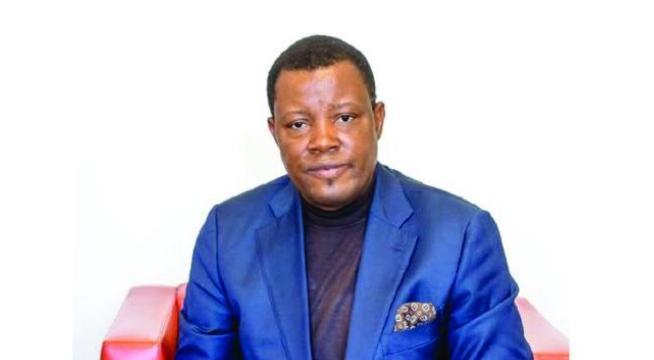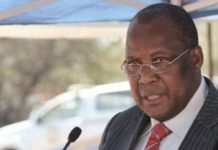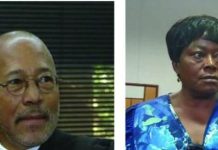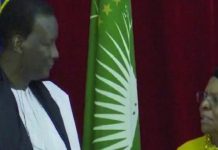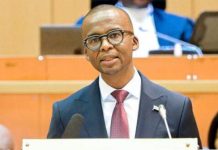Africa-Press – Namibia. Popular Democratic Movement (PDM) leader McHenry Venaani says he once petitioned former president Hage Geingob for the government to consider dropping charges against those convicted in the Caprivi treason case.
He said he tried to open back-channel talks through Frans Kapofi when he was minister of presidential affairs to negotiate an amnesty, but the state did not show interest.
Kapofi served as the minister of presidential affairs under Geingob’s administration from 2015 to 2018.
“I attempted to initiate direct, silent talks between the government and former MP Geoffrey Mwilima. I spoke to president Geingob via the then-minister of presidential affairs, Frans Kapofi, to negotiate an amnesty. But there was no seriousness from the government,” Venaani said in response to questions by the Windhoek Observer on the Caprivi treason case.
Mwilima has been behind bars since August 1999, after he was arrested following the secessionist attacks in the then-Caprivi region.
This comes as five men convicted in the second Caprivi high treason trial last year prepare to appeal their sentences in the Supreme Court.
Acting judge Petrus Unengu granted them leave to appeal during a hearing at the Windhoek Correctional Facility last week.
Venaani said he also reached out to exiled former DTA leader Mishake Muyongo, who he said was concerned about the long detention of the accused.
Muyongo fled to Denmark in 1998 after his attempt to secede the former Caprivi region, now the Zambezi Region, from Namibia failed.
“Muyongo was keen to listen and worried about the long detention,” he said.
He added that any amnesty would require those involved to abandon secessionist activities.
“If one calls for genuine amnesty, there must be a genuine resolve to abandon secessionist activity. If we push for the release of our people, will we find genuine closure? It’s a very complex matter,” he said.
Venaani said at that time, Geingob acknowledged his efforts but often appeared cautious.
“President Geingob appreciated the silent approach I started… He viewed me as a strategist and always wanted to study my game plan. It’s a matter I will reflect broadly on in my memoirs,” he said.
However, reports indicate that Geingob did not support the move to pursue Caprivi’s succession.
The Namibian Presidency’s social media page quoted him in 2019 saying, “How do you want me to accommodate you when you say you are not a Namibian but a Caprivian? That means you’re a rebel. I am the President of the Republic of Namibia.”
Venaani’s comments come as debate has resurfaced after five men convicted in the second Caprivi treason trial were granted leave to appeal their sentences.
Other political party leaders and analysts are divided over whether the government should consider dropping treason charges against those convicted in the Caprivi treason case.
Body of Christ Party leader Tomas Festus said he does not believe the government will drop the charges.
He said Namibia has always treated secession as a direct threat to national unity.
“The government has always been clear that secession is not an option. Given how the state acted in 1999 and how it has handled the treason trials, I do not see them simply dropping charges. Issues of sovereignty are treated very seriously in this country,” he said.
Some of the accused have been in detention for over twenty years, drawing renewed scrutiny and public concern.
Political analyst Sakaria Johannes said the state may no longer need to pursue the prosecution with the same intensity if the group commits to ending its political aims.
“There is no need for the government to continue persecuting the Caprivi treason group, provided there is a guarantee that they will not continue with their political fight,” he said.
Political analyst Ndumba Kamwanyah also said a prolonged prosecution might not be the most effective way forward.
“If the group commits to abandoning secessionist activities, I see no reason to continue with the prosecution. The state must protect sovereignty, but it must also consider reconciliation where possible,” he told the Windhoek Observer.
The Caprivi secession case traces back to the August 1999 attacks in Katima Mulilo, when the Caprivi Liberation Army carried out coordinated strikes on government facilities. In the aftermath, 132 people were arrested and charged with 278 counts ranging from high treason and murder to sedition and public violence.
What followed was a court process that dragged on for more than twenty years. Several accused died in custody. Others remained in detention for years before their cases even reached trial. The first convictions came in 2007, yet parts of the matter were later reopened, resulting in additional convictions and resentencing as recently as 2024 and 2025.
Some of the accused attempted to challenge the court’s authority by insisting the Zambezi region was never legally part of Namibia.
In June, United Democratic Party (UDP) secretary Ronnicah Sipiho urged President Netumbo Nandi-Ndaitwah to order the immediate withdrawal of the Namibian Defence Force from the former Caprivi Strip. Sipiho said the party is calling for self-determination, arguing that residents were never consulted on whether they wanted to be part of Namibia.
For More News And Analysis About Namibia Follow Africa-Press

